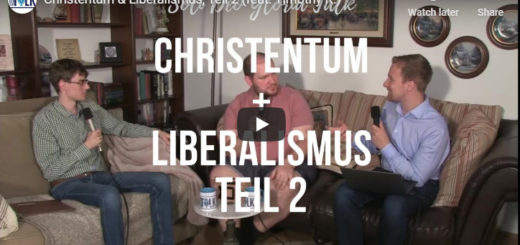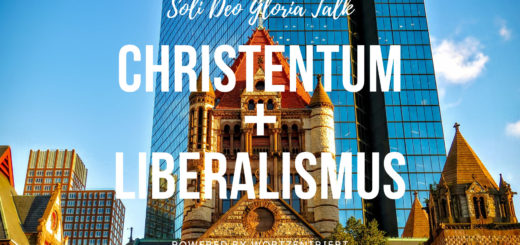Vater-Hunger und das Evangelium der Gnade – Mark Driscoll + Doug Wilson
Wilson Doug: Mark, dein Vortrag auf diese Konferenz wird sich um Männlichkeit (Maskulinität) und Gnade drehen und wir reden gerade über Vater-Hunger, von dem ich denke, dass es die große Krankheit unserer Zeit ist. Könntest du einige Worte zu den Folgen sagen, die das Niederlegen der Männlichkeit mit sich bringt und wie denkst du, dass das Evangelium der Gnade dies anspricht?
Driscoll Mark: Ich denke Männer neigen dazu ihre Verantwortung zu missbrauchen, aufzugeben oder niederzulegen. Niederlegen: Sie schieben sie auf die Kirche, die Schule, eine Institution ab. Aufgeben: Sie gehen einfach, Scheidung, Verschwinden oder sind der abwesende Vater, der zwar da ist aber der Fernseher läuft und er ist nicht engagiert. Und dann gibt es die, die ihre Verantwortung missbrauchen. Sie sind wie ein Tyrann. Sie schubsen ihre Frau und Kinder herum und sind einschüchternd und bedrohlich.
Und die echte Antwort ist, wie Christus zu sein, hart und einfühlsam. Und ein Mann muss beides sein. Hart für seine Familie und einfühlsam zu seiner Familie. In der Evangelikalen Welt sind die Männer oft nur einfühlsam und außerhalb davon sind die Männer oft nur hart. Damit ein Mann wirklich verstehen kann was ein wahrer Mann ist, muss er zu Jesus kommen.Du musst zur Vaterschaft Gottes kommen, der beides ist: hart und einfühlsam.
W: Wenn wir die Vaterschaft Gottes verkündigen, sagen wir damit automatisch etwas Anstößiges für unsere egalitäre und feministische Zeit, aber wir sprechen damit auch ihr tiefstes Bedürfnis an.
D: Wir sehen das hier in Seattle, einer sehr liberalen Stadt, in der, geschichtlich gesehen, das Evangelium keine Wurzeln geschlagen hat. Meine primäre evangelistische Zielgruppe sind junge universitätsgebildete Männer in ihren Zwanzigern. Hauptsächlich junge Männer also. Auch wenn viele andere Leute zur Kirche kommen. Und was wir immer und immer wieder sehen, wenn wir über die Vaterschaft Gottes reden ist, dass Menschen sich bekehren. Es wird geschätzt, dass Gott ein liebender, großzügiger, gütiger und involvierter Vater ist. Indem wir diese Botschaft predigen und Gott als Vater darstellen, sehen wir radikal veränderte Leben und massive Bekehrungen. Ich weiß nicht ob “Wunder”, dass richtige Wort dafür ist, aber es ist sicher unerklärlich.
W: Jesus ist der Weg zum Vater.
D: Ja, Jesus ist der Weg zum Vater und wenn ihr mich gesehen habt, habt ihr den Vater gesehen. Er ist das Bild des unsichtbaren Gottes. Wenn wir etwas an Jesus sehen, das uns gefällt, ist es ein Abglanz des Herzens und Charakters des Vaters.
W: Du kannst nicht von Jesus beten lernen, ohne zum Vater zu beten.
D: Und ganz offen gesagt, sehen wir auch wenig Widerstand. Sogar junge Frauen die sagen: “Ich hatte keinen Vater,“ oder: „Mein Vater war gewalttätig,“ oder: „Er war abwesend und hat mich missbraucht.“ haben immer noch dieses Verlangen nach einem Vater wie auch die Bibel sagt: “Gott ist den Vaterlosen Vater. “ Und dann kommt noch dazu, dass man sieht wie Männer in unserer Gemeinschaft ihre Frauen und Kinder lieben. Sie lieben ihre Töchter wirklich. Du kannst bei uns Männer sehen, voll mit Tattoos, die wie normale Seattler aussehen, die ihre kleinen Töchter am Arm halten sie ausführen und mit ihnen die „Gott hat dich lieb Bibel!“ (Jesus Storybook Bible – Sally Loyd Jones) lesen. Und die Kleine liebt ihren Vater, weil er ein Abbild von Gott, dem Vater ist. Wenn Menschen das sehen, sagen sie: “Wenn es das ist, was du sagst, dann stimme ich zu.“
W: Danke dir.
Übersetzung von uns. Original Transkript unten.
Video Link: http://dougwils.com/s7-engaging-the-culture/father-hunger-and-gospel-food.html
Original Transkript:
Father Hunger and Gospel Food
W: Mark your talk at this conference is going to be related to masculinity and grace and we are just talking after lunch about father hunger which I think is the disease of our era. Would you say just a few things about what the abdicating masculinity does and how you think the gospel of grace addresses that?
D: Yeah I think men tend to abuse, abandon or abdicate their responsibility. Abdicate: they will push it off to the church, the school, an institution. Abandon: They just leave, divorce, disappear, the absentee father or he is there and the TV is on and he is not engaged. And then there are does who abuse it. They are kinda the bully. They sorta push their wife around, push their kids around, kind of intimidating and threatening. And the real answer then is, like Christ, to be tough and tender. And a man needs to be both. He’s gotta be tough for his family. He’s gotta be tender with his family. And often times in evangelicalism the guys are just tender and outside of evangelicalism the guys are just tough. And so far for man to really understand what a true man is you gotta come to Jesus, you gotta come to the fatherhood of God and there we see tough and tender we see both.
W: And when we declare the fatherhood of God. We are saying something that is initially offensive to our egalitarian feminist era but we are also addressing their deepest need.
D: Oh yeah, we have seen that I mean we are in Seattle, very liberal city, historically the gospel has not taken root here. Going after primarily young twenty something college educated singles, there is a lot of people who come to the church but my evangelistic bullseye is right there. Particularly young men and what we see over and over and over, when we talk about the fatherhood of God people get converted. There is an appreciation that God would be, and he is, a loving, gracious, benevolent, involved father. As we continue to preach that message and present God as father we see radical life change massive conversion. That is, which I don’t know if miracle is the right word but it is inexplicable.
W: Jesus is the way to the father.
D: Yah, Jesus is the way to the father and if you have seen me you have seen the father. He is the image of the invisible God. So when you like what you see in Jesus that’s a reflection of the fathers heart and character.
W: You can’t learn how to pray from Jesus without praying to a father.
D: And we quite frankly aren’t seeing resistance here. Even young women come in and say: “I didn’t have a dad,” or: “My Dad was very violent,” or: “He was absent or he abused me.” But there is still a desire for a father and like the bible says: “God’s a father to the fatherless.” And then also too, I think a lot of it is they walk into a community where the man to love their wives and children. They really to love their daughters. So for us. I mean you come to church you are gonna see a lot of young men often times tattooed up looking just like a regular guy in Seattle who is holding his little girls hands and taking her out on daddy dates and reading the Jesus Storybook Bible with her. And she adores her dad because he is a little reflection of God the father. Once people see that it’s like, well yeah if that’s what you are talking about then I vote yes.
W: Thank you.
















